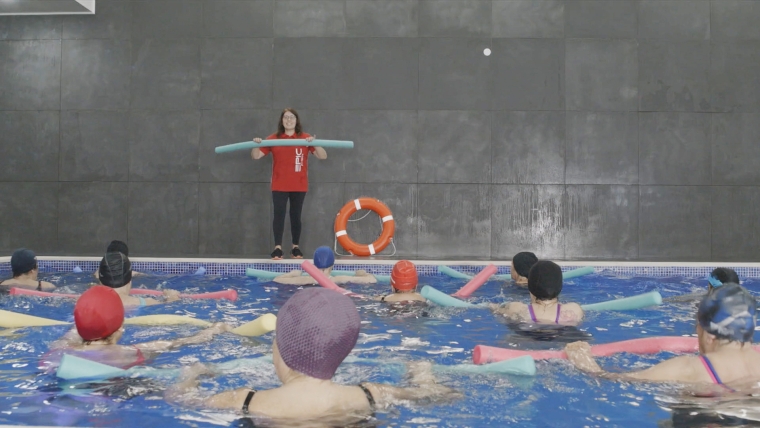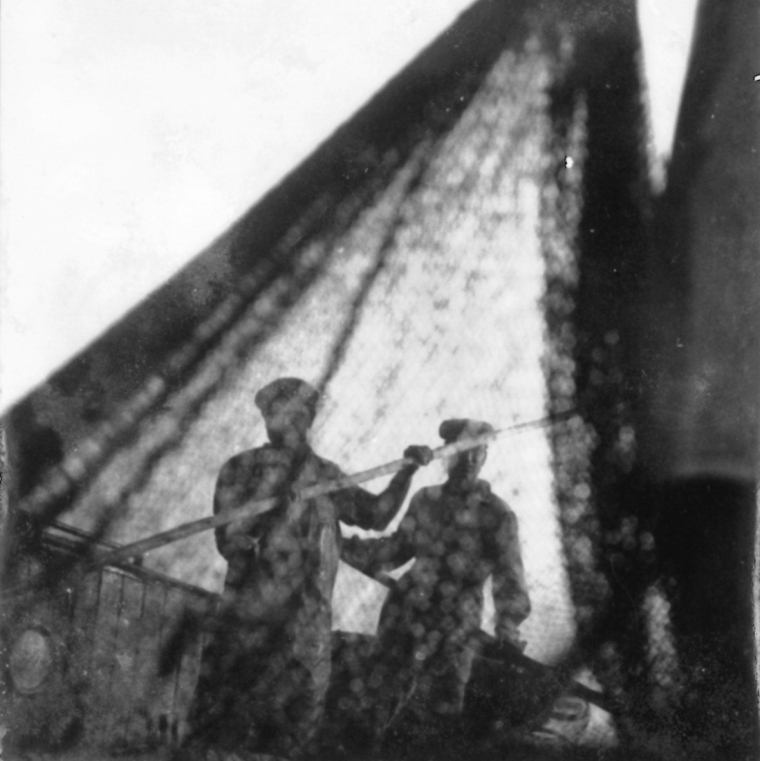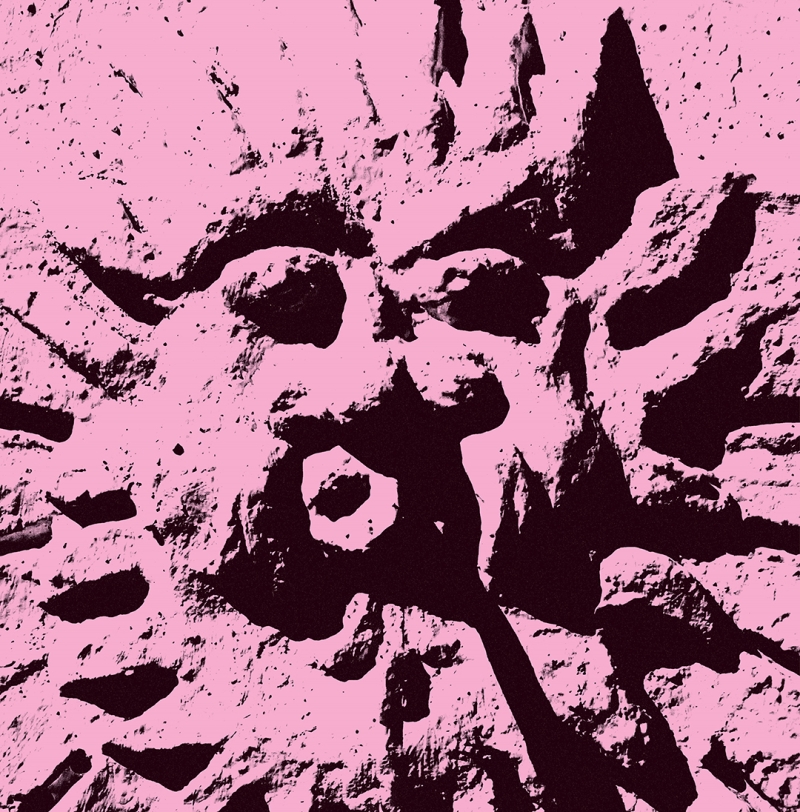Alar da Rede
Michel Giacometti
In the context of LEVA LEVA: Litany of Portuguese Fishermen, a project by FLEE
In 1961 and 1962, the French ethnographer Michel Giacometti, born in Corsica, who was to become an impassioned advocate for Portugal from Trás-os-Montes to the Algarve and the most important guardian of Portuguese sound recording archives, decided to record the sound, followed by film footage, of the letting out of the nets by hand on a Portuguese fishing boat. Sponsored by the Portuguese state broadcaster, Rádio Televisão Portuguesa (RTP), and with the support of Portimão City Council, he embarked on the trawler Nicete belonging to the shipowner José Rita. The result was a short documentary film lasting around 14 minutes called Alar da Rede [Letting Out the Nets]. The 16 mm film was shot and edited by Manuel Ruas, a young cinema enthusiast from Lisbon, and it was aired on Portuguese television for the first time on 9 February 1962.
In an interview with Diário de Lisboa, (→ 1) Giacometti remarked that “he found out that in Portimão there was a song known as the “leva-leva” sung on fishing boats when the nets were let out, and that for him to record the song being sung on board a trawler it took three days and three nights.” Further on, he affirmed that the idea was to show the tremendous effort it took all fishermen to let out the nets and that it lasted for two hours amidst shouting and the singing of the song Leva-leva, a kind of melodious mixture of encouragement, bravery and pain, the recording of which can be seen as an homage to the seafaring man.
…
In the short text that accompanies the recording, Fernando Lopes-Graça explains: “The song, featuring the simple interjection “Leva, leva!”, consists of an expressive melody in a minor scale that goes back and forth, in a question and answer guise, between the lead and the chorus. The addictive rhythm is functionally adapted to the movement and the concerted effort of pulling in the nets. The encouraging shouts overlapping the song add a vibrant realism to the general drama of the situation.”
…
The former fishermen of Portimão interviewed for this article have said that the “Ribolé/Arribalé” song, which means “haul it up”, was adapted from popular songs from that era heard on the radio or at local dances. The fishermen with the best melodic and vocal capacity would choose the music and sometimes the lyrics of the refrain in line with the tastes of the day or the most appreciated type of music, for example fado. This need to captivate his fellow workers, which at times became competitive between teams from different trawlers, added, in our view, vitality to an ancestral practice that did not disappear when mechanical net haulers were installed on the boats, given that the “ribalé” was also chanted when the boat nets were hoisted above the wall in the docks to be mended and repaired. The difficulties in carrying out an exhaustive and authentic study of the fishermen’s shanties were well demonstrated by Guimarães and Freitas (2020).(→ 2) It is accepted that fishermen often sang, but it is not said what they sang about. In 1932, António Graça referred to the difficulty of gaining access to the fishermen’s world, “(strong, rough people) in the eyes of teleost fish; people who harass them and who they try to avoid”.(→ 3) Orlando Ribeiro, in turn, speaks of the “closed fishing community” of the Mediterranean and the Atlantic.(→ 4) Through our own interviews one gathers that in a work context, and in a team that had its own codes and mutual trust on the high seas, there was a certain release from the repressive vigilance and inhibition that existed on land, resulting in a liberating and perhaps even improper expressiveness. The presence of a researcher with audio-visual equipment constituted a, not uncommon, constraint that led to inhibition amongst the fishermen and resulted in recordings that were not totally trustworthy.
…
The “leva-leva” or “Ribolé/Arribalé” was a chant sung in unison with others aimed at instigating, providing rhythm to and coordinating the movements made by fishermen as they hauled in the heavy nets on the sardine trawlers in the Algarve in particular. Without any break for respite, or even team substitutions, it gradually fell into disuse when mechanical net haulers were introduced and following the industrialisation and evolution of fishing systems. The changes that were recorded can at times be attributed to diatopic changes in language or corruptions of the dynamics of the language in its most vernacular form. From the point of view of the melody and how it changed to match the songs that were in vogue, Giacometti’s work, given its technical limits and the complexity of his approach, did not register any significant peculiarities that, in our view, would merit a more in-depth look.
The recording can also be listened to as an artistic musical recreation or as the very unique sound of an old fishing tradition in rapid decline. Similar chants can be found in a region once colonised by the Portuguese: between Gambia and Guinea-Bissau. This is a phenomenon that may lead to new interesting developments in this field.
Excerpts from the text “Contributos para uma (re)leitura do Alar da Rede de Michel Giacometti” [Contributions to a reinterpretation of Michel Giacometti’s Letting Out the Nets] by Carlos Osório, originally published in the book Leva leva: Ladainha de pescadores [Leva leva: Litany of Portuguese fishermen] (FLEE 004, 2022).
-
(1) Diário de Lisboa, issue no. 14068, 11/02/1962, p. 9.
-
(2) Ana Paula Guimarães and Joana Gaspar de Freitas (2020), “Lavrar/navegar. O mar na tradição popular portuguesa”, Imaginários do Mar – Uma Quase Antologia. Lisbon, IELT- FCSH. Vol. 1.
-
(3) António dos Santos Graça (1992), O Poveiro, Lisbon, Dom Quixote, pp. 17-19.
-
(4) Orlando Ribeiro (1991), Portugal – O Mediterrâneo e o Atlântico, Lisbon, Sá da Costa, p. 127.
|
Carlos Alberto Osório graduated in Modern Languages and Literature from Coimbra University’s Faculty of Letters and holds a Master’s Degree in Multimedia Production, Editing and Communication from Algarve University’s FCHS. He teaches Portuguese at the Poeta António Aleixo Secondary School in Portugal and has authored several books on Portimão photographers. |
Founded by Alan Marzo, Olivier Duport and Carl Åhnebrink, FLEE is an independent interdisciplinary publisher, record label and curatorial platform dedicated to the documentation and enhancement of hybrid cultures. Creatively exploring and emphasising the outlines of globalisation from a historical and critical perspective, FLEE focuses on shedding light on subjectively selected cultural phenomena, while interacting with contemporary artistic approaches. Looking at a range of topics and disciplines, from music to architecture, FLEE follows an inclusive work method that favours a diverse range of viewpoints. |
|
With all the restrictions that come with a theoretical and artistic approach, Leva leva: Litany of Portuguese fishermen sets out to pay homage to the men and women who, despite difficult living conditions, managed to create an extremely rich social, poetic and musical tradition thanks to their indisputable courage and wisdom. Viewing that culture through the lens of the chants intoned at work rapidly became a self-evident choice in the context of this project. Not because school, festive or religious songs do not reveal the true nature of a community, but because it is at, and through, work and the interaction it induced among companions that man becomes what he is meant to be and remains closer to his own soul. For, whilst it is true that the exploitation and alienation that are so often inherent to it make the life of a worker and that of the rural labourer and fisherman more difficult, it is no less true that “the work of man is always a mirror in which the conscience recognises its own reflection”. |
|







